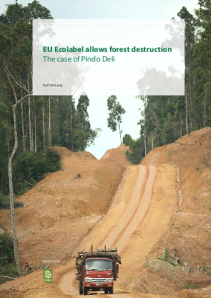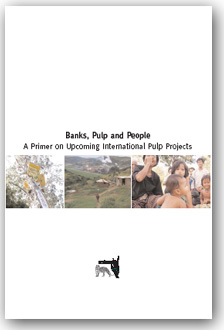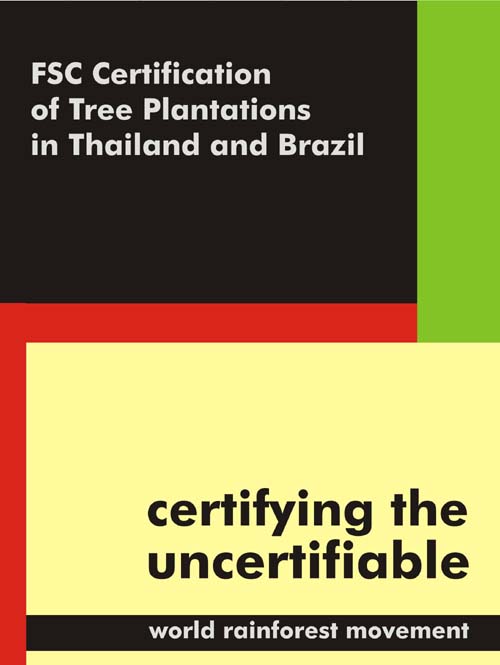Where is Indonesia’s forest moratorium?
By Chris Lang, WRM Bulletin 163, February 2011
Indonesia is a crucial country for REDD. It has one of the fastest rates of deforestation in the world. And, as a direct result of this deforestation (particularly the destruction of peatswamp forests) Indonesia is the world’s third highest emitter of carbon dioxide.
There is currently a battle going on over Indonesia’s forests between the industries that have long benefited from forest destruction and those who want to see the forest sector overhauled. While REDD is often described as a win-win arrangement, the battle in Indonesia is a distinctly win-lose battle. If the industry wins, the forests and the people living in and near forests lose.
In May 2010, Norway and Indonesia signed a Letter of Intent for a US$1 billion deal aimed at reducing emissions from deforestation. An important part of the deal is a two-year logging moratorium, which was supposed to start at the beginning of January 2011. In order for the moratorium to be legally binding, Indonesia’s President Susilo Bambang Yudhoyono has to sign a decree. Unfortunately, he was presented with not one, but several draft decrees. The moratorium is currently stalled, waiting for Yudhoyono’s decision on which decree to sign.
There are three draft decrees currently in the running to be signed. The first was produced on 21 December 2010 by the Ministry of Forestry. The second appeared two days later, written by the REDD-Plus task force (the task force was created in September 2010 as part of the Norway-Indonesia REDD deal). Early in January 2011, the Coordinating Minister for the Economy produced a third draft decree.
There are important differences between the draft decrees. The Ministry of Forestry’s draft decree would apply only to primary forests. The Ministry of Economy draft decree follows the Ministry of Forestry’s example and applies only to primary forest.
This would make the moratorium effectively meaningless, as Bernadinus Steni, the program coordinator for climate change and REDD at the Indonesian NGO Huma (Association for Community and Ecology-Based Law Reform), points out. “There would be no changes if the moratorium would only be for primary forests. Even without the moratorium, primary forests have been declared as protected areas,” he told told the Jakarta Post.
The draft decree from the Ministry of Forestry allows conversion of forests on peat that is less than three metres deep. This means no change from business as usual, as it is already illegal to convert forest on peat deeper than three metres in Indonesia, although this law is often broken by the palm oil and pulp and paper industries.
It gets worse. The Ministry of Forestry draft decree only applies to new contracts. The moratorium applies to “new conversion permits for primary forests and peatland for two years”. Forestry Minister Zulkifli Hasan appears to have already decided which of the draft decrees will be signed. In January 2011, he told Antara News that “The moratorium will apply to primary and peat forests,” although he did not clarify that forests on peat less than three metres deep could still be destroyed.
Another important part of the Indonesia-Norway REDD deal involves establishing a “degraded lands database”. This is no easy task, because what may appear to one person (a forester, for example) as “degraded forest” may be “recovering forest” to another person (a villager managing their community forest or rotational swidden fields, for example).
But even before work on the degraded lands database has started, the Ministry of Forestry’s Hadi Daryanto has already decided how much “degraded land” can be destroyed and converted to industrial tree plantations. While the discussion about the various draft decrees was in full flow, he announced that “Indonesia has 35.4 million hectares of degraded forest that we can designate as agricultural and forest concessions.”
On 2 January 2011, the Jakarta Globe reported that the Ministry had already decided that 500,000 hectares of concessions are to be issued this year in “previously logged areas”.
According to the head of the REDD-plus task force, Kuntoro Mungkusubroto, part of the reason for the delay in implementing the moratorium was lobbying by business interests. He told Antara News that “Our move has been sharply observed by lobbyists such as mining companies and oil palm plantations.”
On 14 January 2011, a group of nine Indonesian-based NGOs put out a press release demanding that the moratorium “be freed from the intervention and pressure of business, politics and corporations.” The NGOs are calling for a review of all forest concessions: “100% of the issued permits of forestry business and forestry-related sectors”.
Three years ago, Indonesia’s President Yudhoyono spoke at the UN climate conference in Bali. “The world is watching,” he said. “I beg you, do not let them down.” Now the world is watching Yudhoyono to see whether he signs a decree for a two-year logging moratorium or allows loopholes in the legislation big enough to drive a fleet of bulldozers through.
* This article was written on 17 January 2011. The Indonesian government has failed to make any progress on implementing the moratorium since then.










HI Chris
I really confused how you can write like this
You seem anti everything
You live in a country allegedly, that you seem to attack
A country not really tolerate of people like you
So you must be getting paid by someone who pays your wage Chris?
Chris
Good morning
Why is it you fail to answer questions about yourself eg)
you appear to be anti REDD under the justification of Indigenous people. Is this right?
This being the case and people working with these groups, than why say they are not?
Also you did not answer my question about how you are funded, as this is not a site of whim, rather a dedicated site with resourced articles.
My concern for you is by taking a stance of anti Government, like Indonesia and clearly you advise you are living there, do you not see this as risky?
Or do they sanction your anti REDD commentary as it gives them leverage for not ceasing deforestation.
So I am just keen to understand your site, you etc and generate my own informed opinion of your site, you and the whole REDD thing.
So as much information about you, your background, who funds you etc would be appreciated.
I guess just like you ask of everyone else :)
See response on REDD-Monitor.